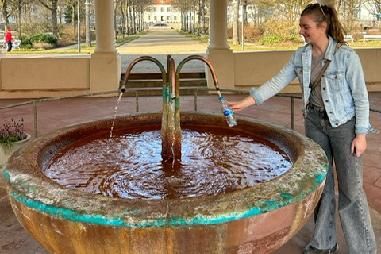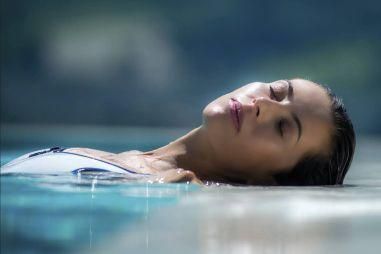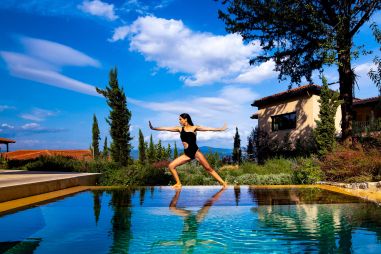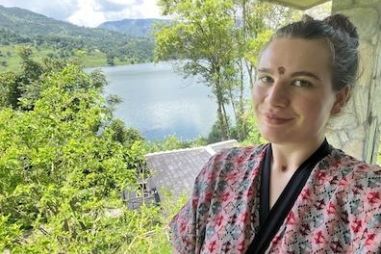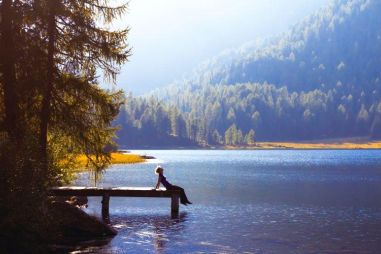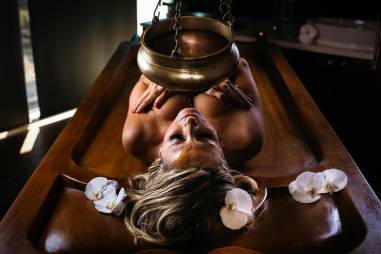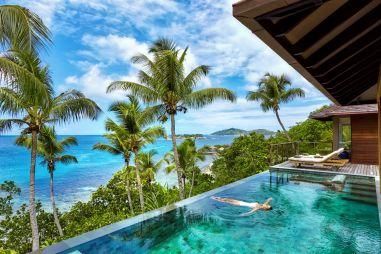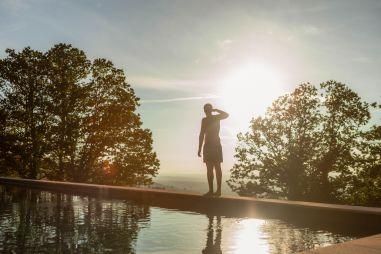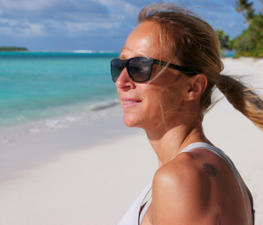PureandCure review: Kim's visit to Kurhaus Hotel Bad Bocklet in Germany
If you’re into Ayurveda and nature, Bad Bocklet in Germany is a hidden gem - and closer than you'd expect. This low-key spa town takes a holistic approach, with a strong focus on authentic Ayurvedic care. No flights needed: within a day’s drive from the Netherlands or Belgium, you’ll find a Kerala-based team offering treatments straight from the source. My partner and I stayed for four nights, taking time to really step away from it all.
- Finding our way: a late arrival in Bad Bocklet
- Traveling to Bad Bocklet by train
- Rooms in Kurhaus Hotel Bad Bocklet
- Ayurveda retreats in Kurhotel Bad Bocklet
- The Spa
- Yoga classes
- Ayurvedic meals or à la carte — the choice is yours
- How Breakfast works
- Walking through the Rhön: the best trails around Bad Bocklet
- Views on Rhön hills
- Bad Kissingen
- Interested in Kurhaus Hotel Bad Bocklet?
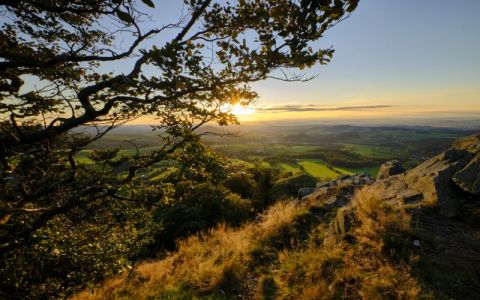
Finding our way: a late arrival in Bad Bocklet
After a drive of about six hours, we arrive - just after dark - in the quiet spa town of Bad Bocklet, not far from the better-known Bad Kissingen and just north of Frankfurt. Finding a parking spot takes a few minutes, but a sign with a QR code near the hotel entrance quickly points us in the right direction. The alternative parking area is close by and has plenty of space. If you’d rather skip the drive, travelling by train is a great alternative. With fast connections to Frankfurt, many guests choose the train for a more relaxed start to their stay (scroll down for more details). Since we arrive after reception has closed, our keys have been neatly placed in a lockbox. Conveniently, we had chosen the code ourselves in advance. With a simple note attached to the key and a clear map displayed at the entrance, it’s easy to find our way to the right part of the hotel.
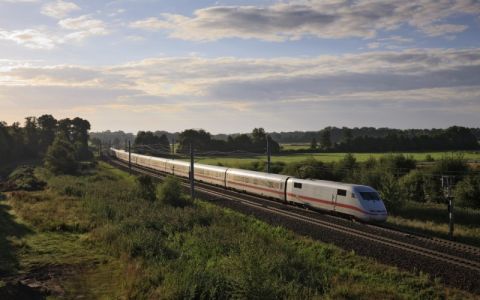
Traveling to Bad Bocklet by train
Getting to Bad Bocklet by train is surprisingly easy. Take an international train to Frankfurt am Main, one of Europe’s major rail hubs. From there, it’s just a regional train ride to either Bad Kissingen or Bad Neustadt (Saale) — both only about 15 to 20 minutes from Bad Bocklet. Depending on your route and departure time, you may have a quick transfer in Würzburg or Fulda. The total journey usually takes around 6 to 7 hours, including transfers. Once you arrive, getting to the hotel is simple: take a taxi (usually the most budget-friendly option) or let the hotel arrange a transfer for you. We're happy to help you choose the option that fits your plans best.
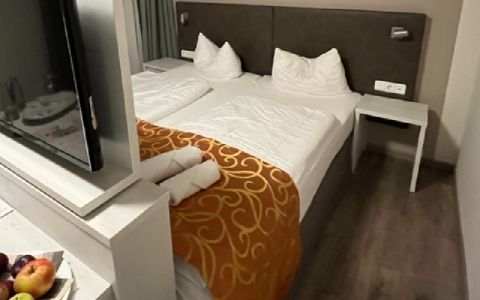
Rooms in Kurhaus Hotel Bad Bocklet
The hotel has 92 rooms—bright, modern, and simply furnished. There are double rooms of about 23 m² and single rooms around 19 m². I am staying in a standard double room. Each room comes with either a bath or shower, a toilet, hairdryer, TV, phone, free Wi-Fi, and a view of the gardens. Rooms with a balcony are available for an extra charge. A bathrobe and slippers are provided.The only downside for me was the pillow - flat and too soft. I wished I’d brought my own. What stood out most during my stay, though, was the silence. No traffic, no city noise—just the sound of trees rustling and birds singing.
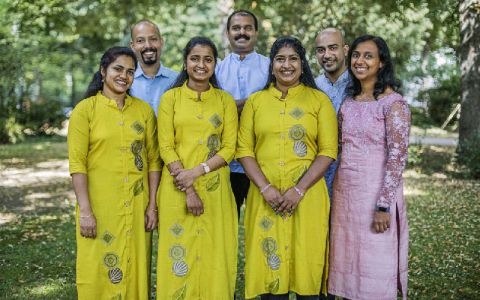
Ayurveda retreats in Kurhotel Bad Bocklet
I had hoped to stay for a full week and experience the complete Ayurveda programme, but unfortunately, my schedule only allows for four days. Still, I get the chance to explore a small taste of it — and it’s more than worth it. Over these two days, I receive an Abhyanga massage (a warm oil massage), Shirodhara (a steady stream of oil gently poured on the forehead), and Pinda Sweda (a massage using warm herbal compresses). Having experienced Ayurveda before in Sri Lanka and India, I can say with confidence that the quality here is truly impressive. The team - originally from India—includes an Ayurvedic doctor, skilled therapists, and chefs who clearly know what they’re doing. During my initial consultation, the doctor asks thoughtful questions about my lifestyle, diet, sleep, and overall health. I leave with practical tips and advice I can take home and continue to use. Note: the Ayurvedic doctor and therapists don’t work on Sundays. So if you arrive on a Saturday afternoon, your treatments will begin on Monday. The doctor and team speak English, which makes communication easy.
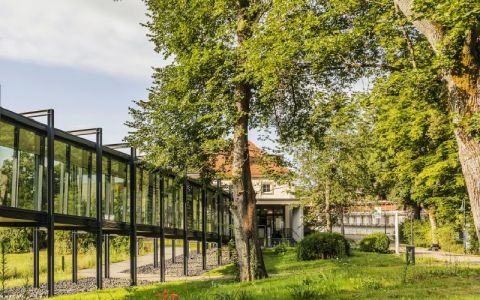
The Spa
A glass walkway connects the hotel to the 'bathhouse' or Spa, so you can head to the spa straight from your room in a bathrobe—no need to step outside. The wellness area feels clean and modern. The pool isn’t large, but it’s fine for swimming a few laps. It’s filled with regular water, not the iron-rich spring water that Bad Bocklet is known for. If you’re keen to try the mineral water, the public thermal baths in town are the place to go. In the hotel’s spa, you’ll also find saunas, a steam room, and several quiet spaces to relax. Just note: the Ayurvedic doctor may advise against sauna use, depending on your dosha type. I didn’t use the spa much during my spring visit, but I can see how it would be a great spot to unwind in the colder months.
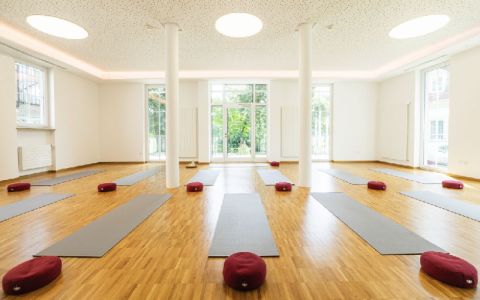
Yoga classes
Every morning there’s a yoga class, usually held in the atmospheric chapel or a dedicated yoga room. You’re also welcome to join, even if you’re a regular guest and not taking part in a full ayurveda programme. During busier periods, two sessions are offered each morning (just sign up in advance). The classes are accessible and suitable for all levels.

Ayurvedic meals or à la carte — the choice is yours
If you’re following an Ayurveda program, you’ll stay on a full-board basis, with daily Ayurvedic meals designed to nourish and support your well-being. Lunch is served as a three-course set menu, while dinner includes two carefully prepared courses. The food is light, healthy, and focused on digestion - in keeping with Ayurvedic principles. That said, Ayurvedic cuisine in Germany is slightly different from what you might find in Sri Lanka or India. The flavours tend to be milder, and the dishes are made with more local and seasonal ingredients. Since not all traditional Ayurvedic herbs and spices are available in Europe, recipes are thoughtfully adapted to what's on hand - without losing the essence of Ayurveda. Dinner changes daily but always stays true to the core of Ayurvedic cooking. With every meal, you’ll receive a pot of hot water at the table — perfect for sipping herbal tea throughout your meal, a simple yet powerful Ayurvedic ritual. If you feel like indulging, the hotel bar offers coffee, cake, and even a glass of wine.
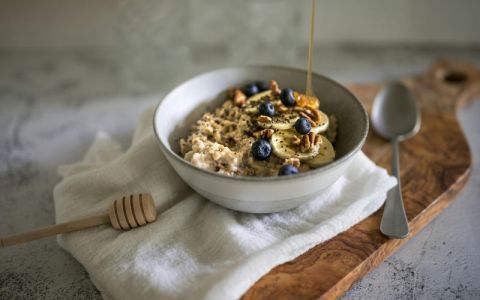
How Breakfast works
I started each morning with a bowl of oatmeal, which I customized with warm fruit, nuts, seeds, and spices. My partner chose from the regular breakfast buffet. One of the Ayurveda guests assumed the fruit was from a can, but that was not the case. In Ayurvedic cooking, fruit is gently steamed, cut into pieces, and served in its own juice. While there are plenty of healthy options, there’s also room for something indulgent. The hotel bar serves coffee, cake, or a glass of wine if you're in the mood.
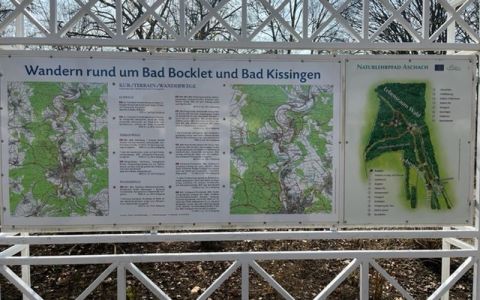
Walking through the Rhön: the best trails around Bad Bocklet
The next morning, I wake to bright sunshine - the kind that instantly lifts your mood. It’s the perfect day to explore the area. Bad Bocklet sits on the edge of the Bavarian Rhön Nature Park, one of Germany’s oldest and most protected landscapes. This region is part of the UNESCO Rhön Biosphere Reserve, where sustainability, local life, and unspoiled nature come together in harmony. The scenery is wonderfully diverse - dense forests, rolling meadows, small streams, ancient basalt hills, and quiet villages spread out in every direction. We put on our hiking shoes and head out for a two-hour walk. At the hotel reception, you’ll find plenty of trail maps.
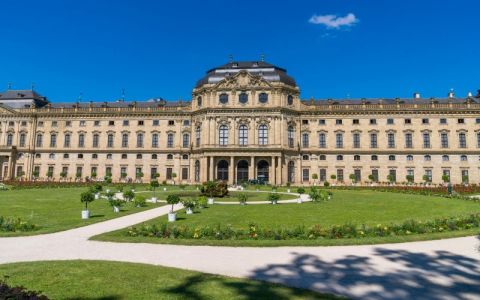
Views on Rhön hills
Many hiking routes start right outside the hotel, from short forest strolls to longer trails with wide views over the Rhön hills. The paths are clearly marked, ranging from gentle woodland tracks to steeper stretches with views across the valley. The area is also ideal for cyclists and anyone who enjoys being in nature. It’s not a touristy place - and that’s part of what makes it special: the quiet, the sound of birds, the breeze through the trees, the smell of the forest. After our walk, we head to Kloster Kreuzberg - a monastery in the Rhön mountains known for its own beer and scenic hiking routes. Later in the day, we take a trip to Würzburg, about an hour away. The city is known for its baroque architecture, wine tradition, and the UNESCO-listed Würzburg Residence.
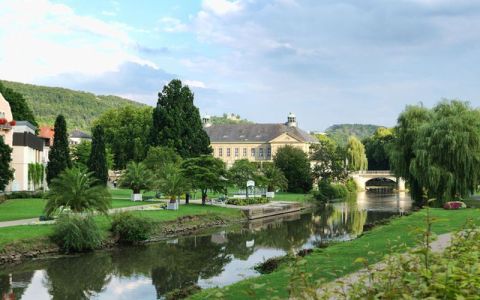
Bad Kissingen
Bad Bocklet is home to the Balthasar Neumann spring, renowned for having the highest iron content of any mineral spring in Germany. You can experience its healing waters in the town’s public baths (the pool at the hotel’s spa are filled with regular water). As we travelled by car, we visited Bad Kissingen, one of Germany’s historic spa towns. Known for its beautifully preserved architecture and therapeutic thermal springs, it’s a lovely place to spend an afternoon. Stroll through the elegant Kurgarten, visit the grand Regentenbau concert hall, or sip healing waters at the Rakuscha Fountain Hall, where you can taste the mineral-rich water straight from the source.
Interested in Kurhaus Hotel Bad Bocklet?
View All Ayurveda and Wellness Programmes
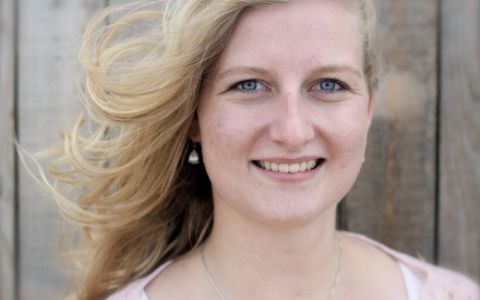
About Kim
Kim (1992) has been part of the PureandCure Team since 2012 and is currently our Operation Manager. She travels around the globe inspecting the PureandCure Health & Wellbeing Hotels, Spas, and Retreats, sharing her experiences and observations in her blogs.

 EN
EN NL
NL BE
BE